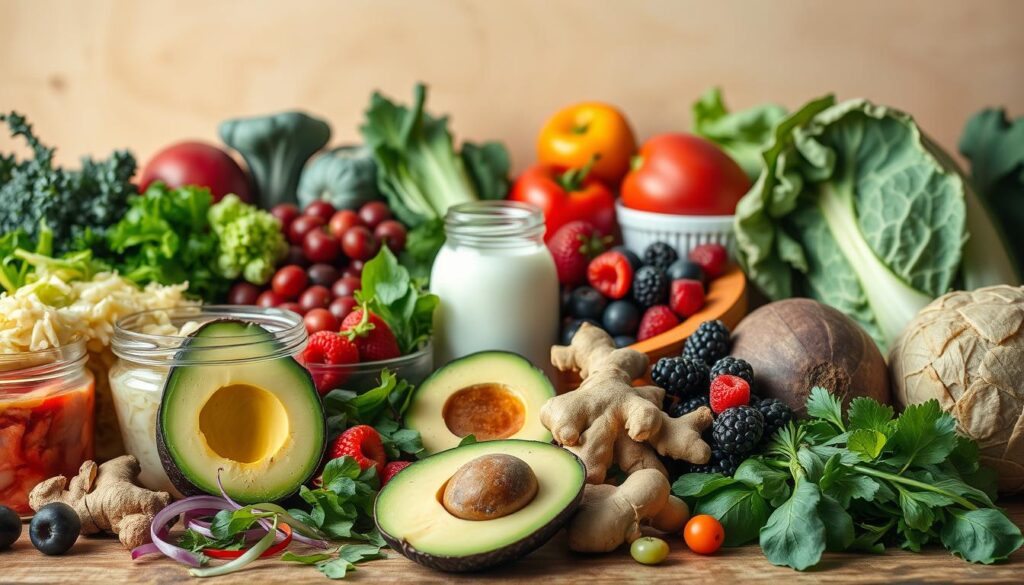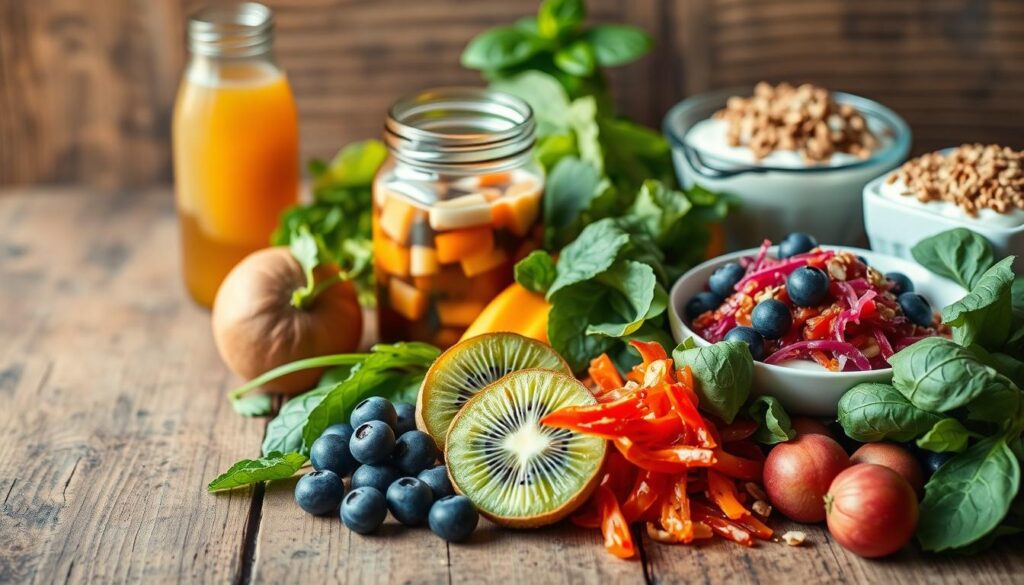Promote Gut Health Through Diet: Expert Advice
You can change your health by choosing the right foods. A healthy gut is key for…

You can change your health by choosing the right foods. A healthy gut is key for a strong body. Studies show that diet is very important for a good gut balance.
Eating the right foods can help your gut health. A diet full of fiber, vitamins, and minerals helps good bacteria grow. This makes you stronger and more resilient.
Key Takeaways
- Understand the importance of a balanced gut microbiome for overall well-being.
- Learn how diet influences gut health and digestive wellness.
- Discover key foods that support a healthy gut microbiome.
- Implement simple dietary changes to improve gut health.
- Experience the benefits of a balanced gut microbiome, from a stronger immune system to improved mental clarity.
Understanding Gut Health and Its Importance
Your gut health is very important for your overall health. It affects digestion and even your mood. The gut is like a “second brain” and is key to feeling well.
A healthy gut has a balanced mix of good bacteria. This mix is vital for digestion, fighting off sickness, and even for your mood.
What Is Gut Health?
Gut health is about the good bugs in your belly. These tiny helpers are key to your health. They help you digest food and keep you from getting sick.
These tiny friends live in your gut. They help you digest food and keep you healthy. If they get out of balance, you might feel sick or have mood swings.
The Role of the Microbiome
The microbiome is very important for your gut. It helps in many ways:
- It breaks down food and helps you absorb nutrients.
- It makes vitamins like K and biotin.
- It keeps your immune system strong and fights off sickness.
- It even affects your mood through the gut-brain connection.
A healthy microbiome is key to a strong immune system and feeling good. If it gets out of balance, you might get sick or feel down. So, it’s important to eat well and live healthy to keep your gut happy.
How Gut Health Affects Overall Well-Being
Gut health is very important for feeling good. A healthy gut means:
- You digest food better and feel less bloated.
- You fight off sickness better and feel less pain.
- You feel happier and less anxious.
- You have more energy and feel physically better.
Keeping your gut healthy is key to feeling your best. Eating right and living healthy can make a big difference. By taking care of your gut, you can improve your life a lot.
Key Nutrients for a Healthy Gut
To keep your gut healthy, knowing the right nutrients is key. A balanced gut microbiome is vital for digestive wellness through diet and health.

Fiber: The Essential Gut Fuel
Fiber is very important for a healthy gut. It feeds the good bacteria, helping your gut stay balanced. Eat lots of fruits, veggies, and whole grains to get more fiber.
Some foods high in fiber are:
- Apples
- Berries
- Broccoli
- Whole wheat bread
- Oats
Probiotics: The Good Bacteria
Probiotics are good bacteria and yeast for your gut. They keep your gut balanced and help with digestion. Find them in foods like yogurt, kefir, and sauerkraut.
Prebiotics: Feeding Your Microbiome
Prebiotics are parts of food that feed the good bacteria in your gut. Foods like asparagus, bananas, and onions are full of prebiotics. Eating these foods helps your gut health.
By focusing on these nutrients, you can help your gut health. This keeps your digestive system balanced.
Foods That Support Gut Health
It’s easy to help your gut health with food. Just pick the right foods. Eating certain foods can make your gut and body healthier.
Fermented Foods to Include
Fermented foods are full of good bacteria. They help keep your gut healthy. Try yogurt, sauerkraut, kimchi, and kefir to add good bacteria to your gut.
- Yogurt (rich in live cultures)
- Sauerkraut (fermented cabbage rich in probiotics)
- Kimchi (Korean fermented vegetables)
- Kefir (a fermented milk drink)
High-Fiber Foods to Consider
Fiber is key for a healthy gut. It feeds the good bacteria. Eat fruits, vegetables, whole grains, and legumes to help your gut.

- Apples (rich in soluble fiber)
- Broccoli (high in insoluble fiber)
- Quinoa (a whole grain rich in fiber)
- Beans (legumes high in fiber and protein)
Foods to Limit for Optimal Gut Health
Some foods are not good for your gut. Processed foods, high-sugar foods, and unhealthy fats can harm your gut. Eating less of these foods helps keep your gut healthy.
- Processed snacks
- Sugary drinks
- Foods fried in unhealthy oils
Choosing the right foods is important for your gut health. Eat fermented and high-fiber foods. Avoid processed and sugary foods. This can greatly improve your health.
The Connection Between Diet and Gut Disorders
Diet is very important for gut health. What you eat can help or hurt your gut. It’s key to focus on diet for gut health.

Common Gut Disorders Linked to Diet
Many gut disorders are linked to diet. These include IBS, IBD, and SIBO. Knowing how diet affects these conditions helps manage symptoms.
IBS causes belly pain, bloating, and bowel changes. Some foods can make IBS worse. Changing your diet can help.
IBD causes long-term inflammation in the gut. Diet can help manage IBD symptoms. But, how foods affect IBD varies from person to person.
How Diet Can Help Manage Symptoms
Good diet choices can help with gut disorders. For IBS, eating less FODMAPs can help. Also, eating enough fiber can make bowel movements better.
- Eat more fiber from fruits, veggies, and whole grains.
- Stay away from foods that make symptoms worse.
- Add probiotics or prebiotics for gut health.
When to Seek Professional Help
While diet changes help, sometimes you need a doctor. If symptoms don’t go away or are very bad, see a doctor or dietitian.
They can make a plan just for you. This plan ensures you get the right nutrients and feel better.
Hydration and Gut Health
Drinking enough water is key for optimal digestion and gut function. Water helps break down food and absorb nutrients. It also stops constipation. Drinking water all day helps your gut health a lot.

The Role of Water in Digestion
Water is very important for digestion. It helps dissolve nutrients and minerals. This makes them easier for your body to use. It also stops constipation by making stool soft and helping you go regularly. Not drinking enough water can cause bloating and discomfort.
Drinking at least eight glasses of water a day is good for gut health. But, how much you need can change based on how active you are, where you live, and your health.
Herbal Teas and Their Benefits
Herbal teas are also good for your gut. Teas like peppermint, chamomile, and ginger are anti-inflammatory. They can calm your digestive system. For example, peppermint tea can help with IBS, and ginger tea can lessen nausea.
- Peppermint tea: Eases IBS symptoms
- Chamomile tea: Soothes the digestive system
- Ginger tea: Reduces nausea and inflammation
Avoiding Sugary Beverages for Gut Wellness
Drinking water is good, but some drinks are bad for your gut. Sugary drinks like soda and sports drinks can upset your gut bacteria. They are full of sugar, which feeds bad bacteria and messes up your gut balance.
To keep your gut healthy, don’t drink sugary drinks. Choose water or herbal teas instead. This small change can help a lot with your gut health and digestion.
Meal Planning for Gut Health
A good diet is very important for enhancing gut health through nutrition. Eating the right foods helps your gut and health. It’s not just about picking healthy foods. It’s about making a diet that feeds your gut well.
Easy Meal Prep Ideas
Meal prep is a simple way to eat gut-friendly foods. Make meals ahead that are full of fiber and probiotics. Here are some easy ideas:
- Overnight oats with fruit and nuts
- Salads with grilled chicken and many vegetables
- Quinoa bowls with roasted veggies and lean protein
Building a Gut-Friendly Grocery List
Start a gut-friendly grocery list to help with meal planning. Include whole foods like fruits, veggies, grains, and lean proteins. Some good items are:
- Fermented foods like yogurt and sauerkraut
- High-fiber foods like beans and broccoli
- Prebiotic-rich foods like asparagus and bananas
Incorporating a Variety of Foods
It’s important to eat a variety of foods for a healthy gut. Eat different colored fruits and veggies to get lots of nutrients. Also, change up your protein and grains to keep your diet interesting and full of nutrients.
By using these meal planning tips and focusing on diet tips for gut health, you can help your gut and overall health.
Lifestyle Factors Impacting Gut Health
Keeping your gut healthy is more than just eating right. It’s also about how you live. Stress, exercise, and sleep all play big roles in your digestive health.
Stress Management Techniques
Stress can really hurt your gut. It makes your body slow down digestion and feel uncomfortable. To fight stress, try meditation, yoga, or deep breathing exercises. These can calm your mind and help your gut feel better.
- Meditation: Regular meditation can reduce stress levels and improve gut motility.
- Yoga: Certain yoga poses can help alleviate digestive issues by reducing stress and improving flexibility.
- Deep Breathing Exercises: Simple deep breathing can calm the nervous system and aid digestion.
The Influence of Exercise on Digestion
Exercise is great for your health and your gut. It helps digestion and keeps your gut moving. Whether it’s walking, jogging, or gym time, moving your body is good for your gut.
- Aim for at least 30 minutes of moderate-intensity exercise per day.
- Incorporate a mix of cardio and strength training for overall wellness.
- Find activities you enjoy to make exercise a sustainable part of your lifestyle.
Sleep’s Role in Gut Health
Good sleep is key for a healthy gut. Bad sleep can mess up your gut’s balance and cause digestive problems. Try to sleep 7-9 hours each night. A good bedtime routine and a comfy sleep space can help you sleep better.
- Establish a consistent sleep schedule.
- Create a bedtime routine that signals your body it’s time to sleep.
- Avoid screens and stimulating activities before bedtime.
By focusing on these lifestyle areas, you can improve your digestive health and overall well-being. It’s not just about food. How you live affects your gut health too.
Food Intolerances and Gut Health
Learning about food intolerances and gut health can change your life. Food intolerances happen when your body can’t digest some foods. This leads to symptoms like bloating and pain that can really hurt your life.
Identifying Common Food Intolerances
Some common food intolerances are lactose, gluten, and food additives. Symptoms include bloating, gas, and stomach pain. Finding out which foods cause these problems is key to feeling better.
- Lactose intolerance: Trouble digesting lactose, a sugar in milk and dairy.
- Gluten intolerance: Being sensitive to gluten, a protein in wheat, barley, and rye.
- Fructose malabsorption: Trouble absorbing fructose, a sugar in fruits and some veggies.
How to Modify Your Diet
To manage food intolerances, start by figuring out which foods are the problem. A food diary can help track these foods. Then, cutting them out can really help your gut.
Adding gut-friendly eating habits is also important. Eat a variety of fruits, veggies, and whole grains. These foods are great for your gut.
The Importance of an Elimination Diet
An elimination diet is a great way to find out which foods bother you. You remove suspected foods for 2-3 weeks and then add them back one at a time. This helps you see which foods are the culprits.
Following an optimal gut health diet helps too. Avoid foods that make you sick and eat foods full of nutrients. Adding fermented foods and probiotics to your diet is also good for your gut.
By understanding and managing food intolerances, you can greatly improve your gut health and overall health.
Tips for Long-Term Gut Health Maintenance
Keeping your gut healthy is a long-term job. It needs effort and dedication every day. By adding diet tips for gut health to your routine, you help your gut stay balanced and healthy.
Start by making lasting changes to your diet. Eat foods high in fiber, fermented foods, and foods that boost collagen. For more on gut health, check out Healthline’s guide on gut health.
Nourishing Your Gut
Take care of your gut by watching its health and changing your diet when needed. This helps you spot and fix any gut problems early.
Seeking Professional Guidance
Talking to a nutritionist or healthcare expert can give you personal advice on gut health. They can make a plan just for you to keep your gut healthy.
FAQ
What is gut health, and why is it important?
Gut health is about the balance of good bacteria in your stomach. It’s key for feeling good, as it helps with digestion and keeps you healthy. Eating right is important to keep your gut happy.
How can I support my gut health through dietary choices?
Eating foods rich in fiber and probiotics helps your gut. Foods like yogurt and bananas are good for your gut. Adding these to your diet can make your digestion better.
What are some common gut disorders linked to diet?
Diet can cause problems like IBS, IBD, and SIBO. Changing what you eat can help. It’s important to know which foods make you sick.
How does hydration impact gut health?
Drinking water is important for your gut. It helps your body use nutrients better. But, sugary drinks can hurt your gut health.
What lifestyle factors impact gut health beside diet?
Stress, exercise, and sleep also matter for your gut. Reducing stress and getting enough sleep helps your gut. These habits work with diet to keep your gut healthy.
How can I identify and manage food intolerances?
Watch how your body reacts to food. You might need to try an elimination diet. Avoiding foods that make you sick helps. A doctor or dietitian can help you figure it out.
What are some tips for maintaining long-term gut health?
For long-term gut health, make lasting diet changes. Keep an eye on how your gut feels. Getting advice from nutrition experts is also key.
Can probiotics and prebiotics really make a difference in gut health?
Yes, they can really help. Probiotics add good bacteria, and prebiotics feed them. Eating foods like yogurt and bananas supports a healthy gut.
How can I incorporate more fiber into my diet for better gut health?
Eat more fruits, veggies, whole grains, and legumes. Foods like berries and quinoa are full of fiber. Slowly adding these to your diet helps your gut.
